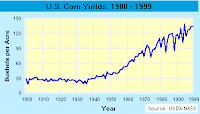In the hubbub that has become the subject of global warming I have seen a huge amount of finger pointing, dire predictions and offhanded scoffing. What I haven't seen is any attempt to urge discussion of adaption to a global danger that will likely persist for some time even if human kind pulls the plug on dirty fuels. Zakaria's take:
Scientists estimate that simply to keep greenhouse gases at their current levels, we would need to slash carbon-dioxide emissions by 60 percent. Given current and foreseeable technology, that would require cutting back on industrial activity across the globe on a scale that would make the Great Depression look very small. In fact, the future will almost certainly involve substantially greater emissions of CO2. Most studies predict that the world will double its consumption of energy by 2050. Since much of that growth in consumption will take place in China and India, it will involve the burning of fossil fuels.Between them, these two countries are currently building 650 coal-fired power plants. The combined CO2 emissions of these new plants is five times the total savings of the Kyoto accords—that is, if the Kyoto targets were being adhered to by Western countries, which they are not. Even under the most optimistic scenarios the industrialized world will continue to burn substantial amounts of coal and oil.
I state these facts plainly not to induce fatalism or complacency. It's scandalous that we're not weaning ourselves off dirty fuels. Perfecting just two new (and almost workable) technologies—clean coal and hybrid cars—would be a giant leap forward. We could be experimenting with hundreds more technologies and techniques. But even so, the Earth would still warm substantially over the next few decades. So in addition to our efforts to prevent and mitigate climate change, we need to employ another strategy—adaptation[...]
(emphasis added by me)
This is a direction I'm welcoming wholeheartedly. Regardless of whether human kind is directly, slightly or not at all responsible for global climate change it is happening and from where I'm standing there is zero consideration of how we'll adapt to it.
We might well start with determining the impact of climate change on US agricultural trends in combination with the decline of farms [1]. While technology and more advanced cropping may have served to offset [2 for example] this decline a shift in climate might well bring agricultural ruin to America's breadbasket. That's only the tip of the iceberg as far as agricultural effect from climate change (consider the effect of drier weather patterns in countries reliant on rice) and a mere inkling of the adaptions we should be discussing. Too much energy and attention is wasted on the blame debate, end of the world scenarios and blatant ignorance. A constructive start in a new direction should begin with:
Here's what's happening now.
Here's the best case and worse case scenario for what could happen.
Here's where we can adapt to the worst case scenario and here's where we cannot.
We need to take a step back from the hysteria and begin assembling a theoretical framework for adaption.
1.

2.






2 comments:
Zakaria & TPMB have it right; adapt and realize that (a) the threat may be overhyped and (b) there is not much we can do to stop it or even halt it, thus we should spend wisely and avoid the hysterics. But fear sells so much better than facts and certainly hope.
Interesting is the effect of weather patterns on geopolitics; for example, a strong El Nino that causes serious drought in India and China could terribly exacerbate existing internal tensions and how these countries and others react would greatly affect US interests.
Eddie,
Thanks for swinging by. I couldn't agree more. Less hysteria and more preparation/adaption. But then, some political campaigns in '08 will likely hinge on the fear generated from global warming. As you say, fear sells.
Post a Comment